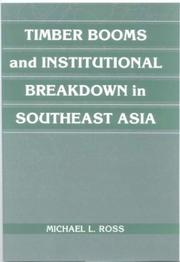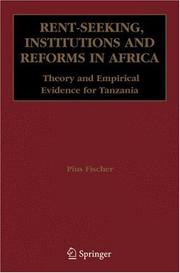| Listing 1 - 8 of 8 |
Sort by
|
Book
Year: 2020 Publisher: London : University of Huddersfield Press,
Abstract | Keywords | Export | Availability | Bookmark
 Loading...
Loading...Choose an application
- Reference Manager
- EndNote
- RefWorks (Direct export to RefWorks)
The Power in the Land challenges the pessimistic belief, nurtured by the depressions of the last two decades, that unemployment is now a permanent feature our society. The author elaborates policies, based on a radical reform of the tax system, which would banish involuntary unemployment and generate continuous economic growth.
Book
ISBN: 303076303X 3030763021 Year: 2021 Publisher: Cham, Switzerland : Palgrave Macmillan,
Abstract | Keywords | Export | Availability | Bookmark
 Loading...
Loading...Choose an application
- Reference Manager
- EndNote
- RefWorks (Direct export to RefWorks)
Rent (Economic theory) --- Economic rent --- Ground-rent --- Economics --- Land use --- Rent seeking
Book
ISBN: 081013408X 9780810134089 9780810134072 0810134071 9780810134065 0810134063 Year: 2017 Publisher: Evanston, Illinois
Abstract | Keywords | Export | Availability | Bookmark
 Loading...
Loading...Choose an application
- Reference Manager
- EndNote
- RefWorks (Direct export to RefWorks)
Phenomenology. --- Rent (Economic theory) --- Economics --- Land tenure --- Land use --- Philosophy. --- Economic aspects.
Book
ISBN: 303078861X 3030788601 Year: 2021 Publisher: Cham, Switzerland : Palgrave Macmillan,
Abstract | Keywords | Export | Availability | Bookmark
 Loading...
Loading...Choose an application
- Reference Manager
- EndNote
- RefWorks (Direct export to RefWorks)
Economic development --- Rent (Economic theory) --- Economic rent --- Ground-rent --- Economics --- Land use --- Rent seeking --- Development, Economic --- Economic growth --- Growth, Economic --- Economic policy --- Statics and dynamics (Social sciences) --- Development economics --- Resource curse

ISBN: 1107121639 1280430052 9786610430055 0511175817 0511041195 0511156472 0511302576 0511510357 0511046863 9780511041198 0521791677 9780521791670 9780511510359 9781107404816 1107404819 9780511302572 Year: 2001 Publisher: Cambridge, UK New York Cambridge University Press
Abstract | Keywords | Export | Availability | Bookmark
 Loading...
Loading...Choose an application
- Reference Manager
- EndNote
- RefWorks (Direct export to RefWorks)
Scholars have long studied how institutions emerge and become stable. But why do institutions sometimes break down? In this book, Michael L. Ross explores the breakdown of the institutions that govern natural resource exports in developing states. He shows that these institutions often break down when states receive positive trade shocks - unanticipated windfalls. Drawing on the theory of rent-seeking, he suggests that these institutions succumb to a problem he calls 'rent-seizing' - the predatory behavior of politicians who seek to supply rent to others, and who purposefully dismantle institutions that restrain them. Using case studies of timber booms in Indonesia, Malaysia and the Philippines, he shows how windfalls tend to trigger rent-seizing activities that may have disastrous consequences for state institutions, and for the government of natural resources. More generally, he shows how institutions can collapse when they have become endogenous to any rent-seeking process.
Forest management --- Forest policy --- Logging --- Timber --- Rent (Economic theory) --- Economic rent --- Ground-rent --- Economics --- Land use --- Rent seeking --- Forest production --- Building materials --- Forest products --- Lumber trade --- Forests and forestry --- Lumber --- Tree farms --- Trees --- Wood --- Forest harvesting --- Pulpwood --- Harvesting --- Lumbering --- Forestry engineering --- Forest resource policy --- State and forestry --- Economic policy --- Forest administration --- Forest plants --- Forest resource administration --- Forest resource management --- Forest stewardship --- Forest vegetation management --- Forestry management --- Stewardship, Forest --- Vegetation management, Forest --- Ecosystem management --- Natural resources --- Environmental aspects --- Economic aspects --- Government policy --- Management --- Administration --- Control --- Rent (Economic theory). --- Social Sciences --- Political Science
Book
ISBN: 1498525377 0739177877 9780739177877 0739177869 1306094216 9781306094214 9780739177860 Year: 2013 Publisher: Lanham
Abstract | Keywords | Export | Availability | Bookmark
 Loading...
Loading...Choose an application
- Reference Manager
- EndNote
- RefWorks (Direct export to RefWorks)
This book describes in a game-theoretical approach how the development success story Vietnam managed to keep rent seeking in check sufficiently to attract record numbers of foreign investors and exhibit strong economic growth in the early stages of its economic reforms. It concludes that pluralistic contestation among societal interests under conditions of factor mobility can lead to the same benefits that are generally associated with liberal democracy-commitment to limited government through checks and balances.
Decentralization in government --- Economic development --- Investments, Foreign --- Rent seeking --- Economic aspects --- Vietnam --- Economic policy --- Development, Economic --- Economic growth --- Growth, Economic --- Centralization in government --- Devolution in government --- Government centralization --- Government decentralization --- Government devolution --- Rent (Economic theory) --- Economics --- Statics and dynamics (Social sciences) --- Development economics --- Resource curse --- Political science --- Central-local government relations --- Federal government --- Local government --- Public administration --- E-books
Book
ISBN: 9791035107840 2859447482 Year: 2021 Publisher: Paris : Éditions de la Sorbonne,
Abstract | Keywords | Export | Availability | Bookmark
 Loading...
Loading...Choose an application
- Reference Manager
- EndNote
- RefWorks (Direct export to RefWorks)
Ce livre n’est pas un nouveau précis d’économie sur la rente : il utilise cette notion pour étudier les trajectoires africaines de développement et sonder leurs possibilités de changement. Les rentes sont ici définies comme des flux de ressources déconnectées des activités productives. Elles reflètent l’histoire tragique de la connexion de l’Afrique au système mondial : de la traite esclavagiste aux ressources extractives, qui fondent la croyance en une « malédiction des ressources naturelles », en passant par l’aide extérieure ou les remises migratoires, les systèmes économiques rentiers scellent les relations asymétriques entre territoires africains et acteurs extérieurs autant que le divorce entre intérêt des élites et population. Enracinés dans l’histoire, ils se sont étoffés et diversifiés depuis la fin du xxe siècle, au point d’apparaître comme un fait de structure, le nœud gordien du sous-développement. La géographie des rentes est une géographie politique. Par ce « voyage » à travers des situations rentières aux implications différentes. qui conduit le lecteur le plus souvent en Afrique de l’Ouest et du centre, l’auteur interroge les espaces de bifurcation associés à une double révolution, où réside l’essentiel du potentiel d’émergence africain, la première est démographique et urbaine, liée à l’explosion de la population et des villes, qui crée des conditions favorables à l’essor de marchés intérieurs, la seconde est polilico-économique ; elle tient à lu négociation progressive de nouvelles conditions de production et d’investissement des rentes, notamment extractives. Sa valorisation suppose l’invention de modèles de gouvernance plus efficaces et démocratique.
Economic development --- Rent (Economic theory) --- Regional planning --- Africa --- Economic policy. --- Economic conditions. --- Economic rent --- Ground-rent --- Economics --- Land use --- Rent seeking --- Development, Economic --- Economic growth --- Growth, Economic --- Economic policy --- Statics and dynamics (Social sciences) --- Development economics --- Resource curse --- développement --- géographie --- XXe siècle --- Afrique --- rente --- condition économique --- géographie économique --- démographie urbaine

ISBN: 128113340X 9786611133405 0387337733 0387337725 1441941495 Year: 2006 Publisher: New York : Springer,
Abstract | Keywords | Export | Availability | Bookmark
 Loading...
Loading...Choose an application
- Reference Manager
- EndNote
- RefWorks (Direct export to RefWorks)
This book identifies rent-seeking behaviour as one of the main causes of poor economic performance, observed, among other places, in many countries of Africa. Rent-seeking describes the ability to capture incomes without producing output or making a productive contribution. Since rent-seekers are often an integral part of an ailing economy and resist the adoption of reforms, understanding and anticipating rent-seeking behaviour is crucial for designing more adequate and effective policy reforms. Following a comprehensive theoretical elaboration of the causes, properties and consequences of rents and rent-seeking strategies in the context of economic reforms and development cooperation, this book presents a detailed case study on rent-seeking within the civil service, parastatal sector and business community. It demonstrates how rent-seekers in Tanzania have systematically delayed or undermined reforms such as tax reforms, trade liberalisation, privatisation or any reforms that aim to restrain corruption and embezzlement. The case study quantifies and evaluates the rent-seeking behaviour of more than 300 parastatal companies, considering their profits and losses, the quality and timeliness of their accounting and the magnitude of support they obtained from 16 different sources. Though it is often difficult to describe rent-seeking empirically—many aspects are hidden and obscured by all sorts of fake explanations—the study at hand explores the maze of endless, general and disaggregated information and traces as many indications of rent-seeking as possible. This broad and detailed approach makes the study unique not only for Tanzania but also within the literature on rent-seeking and development cooperation.
Rent (Economic theory) --- Transfer payments --- Tanzania --- Economic conditions. --- Government transfer payments --- Payments, Transfer --- Expenditures, Public --- Income distribution --- National income --- Economic rent --- Ground-rent --- Economics --- Land use --- Rent seeking --- Accounting --- Development economics. --- Culture-Study and teaching. --- Economic policy. --- Social policy. --- Development Economics. --- Regional and Cultural Studies. --- Economic Policy. --- Social Policy. --- National planning --- State planning --- Economic policy --- Family policy --- Social history --- Economic nationalism --- Economic planning --- Planning --- National security --- Social policy --- Economic development --- Culture—Study and teaching.
| Listing 1 - 8 of 8 |
Sort by
|

 Search
Search Feedback
Feedback About UniCat
About UniCat  Help
Help News
News